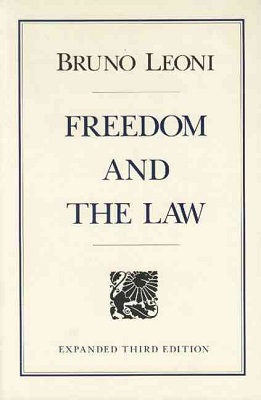During the month of February, I’ll have the pleasure to coordinate a Virtual Reading Group on Bruno Leoni’s Freedom and the Law. I will write some rather impressionistic blog posts on the book, which I have read and read again over the years. Freedom and the Law is a short work, which emerged out of lectures that Leoni gave at Claremont College, thanks to Arthur Kemp, who was a good friend of Leoni. My American acquaintances are often surprised to know that the book, published in the United States in 1961, was translated and published in Italy only in 1995.
Leoni was by no means unknown in his own country; he chaired the department of political science in Pavia, was a prominent lawyer, was friends with some of the most important scholars of his time, wrote regularly for the newspaper 24 Ore and was connected to the Liberal Party. But he died suddenly and unexpectedly at age 54, in 1967, and his memory was soon neglected. Leoni died right before the fateful year of 1968 and none of his students, including the most brilliant one, had either his worldview or his panache.
Mario Stoppino, the one who had the strongest intellectual bond with him, published a collection of his essays in 1980, but that was for years the only publishing endeavor bearing Leoni’s name on the cover. After 1967 comes 1968 and though we tend to remember some of the most colorful and harmless offspring of the students’ movement, those years weren’t easy ones in Italy if you didn’t align with the left. Never forget that in Italy communist terrorism was a real thing: the Red Brigades succeeded in kidnapping and killing former prime minister Aldo Moro, in 1978. The publishing houses, in Italy, were typically courting the left (where most of the readers are, anyway) and academia began to falter too.
So, Leoni was forgotten until, in a much quieter Italy, Raimondo Cubeddu, one of the true liberals in Italian universities, took a personal interest in Leoni and began to promote him with great vigour.
In this regard, Italians of a classical liberal persuasion are greatly indebted to the Liberty Fund, which republished Freedom and the Law in 1991, thus giving a second life to the book (the original publisher was Van Nostrand/ the Volcker Fund).
For libertarians joining our discussion group, it may be worth considering the relationship between Leoni and F. A. Hayek. Hayek expressed ins admiration in a beautiful obituary for Leoni. The picture of Leoni that comes out, vividly, is one of a tireless mind but also of a tireless man, who tried to put his tremendous energy to the service of the classical liberal cause. The Austrian school strongly influenced Leoni: he read and admired Mises, interacted extensively (also because of the Mont Pelerin Society) with Hayek and he even appreciated a young Murray Rothbard. In an essay he wrote on monopoly, he built on Rothbard’s Man, Economy and State.
The issues of the relationship between Leoni and Hayek have been at the center of scholarly attention. The most recent contribution is by Antonio Masala, a foremost scholar and intellectual biographer of Leoni, who writes on the exchanges between the two thinkers and the journal Il Politico, which Leoni established and filled, in those years, with essays from his classical liberal friends. Masala’s paper is aptly published in Il Politico. Of Hayek’s scholars, the one who has paid more attention to Leoni is Jeremy Shearmur (see his Hayek and After).
It is important to see that Leoni wanted to correct what he thought were Hayek’s misconceptions, on the nature of the law. He took issue with some of Hayek’s Cairo lectures and wanted to convince his friend that he needed to focus his own ideas better. As Todd Zywicki puts it,
it was Leoni that introduced Hayek to the common law, which then became the heart of LLL. In so doing, of course, Leoni also introduced Hayek to his distinctive interpretation of the common law, rather than the modern realist-positivist view. Indeed, the novelty of the focus on the common law in LLL is striking: up until that time, the common law gets very little mention in either The Road to Serfdom or The Constitution of Liberty, both of which focus on the formalist Rechstaat notion of the rule of law. Then, the common law appears full-blown in LLL, with virtually no prior mention, and with a distinctive similarity to Leoni’s version.
Libertarians joining our VRG may then easily find themselves at home and recognized in Freedom and the Law concepts and ideas that migrated in subsequent literature. Others may anyway discover a most creative and original legal theorist.



Comments are closed.